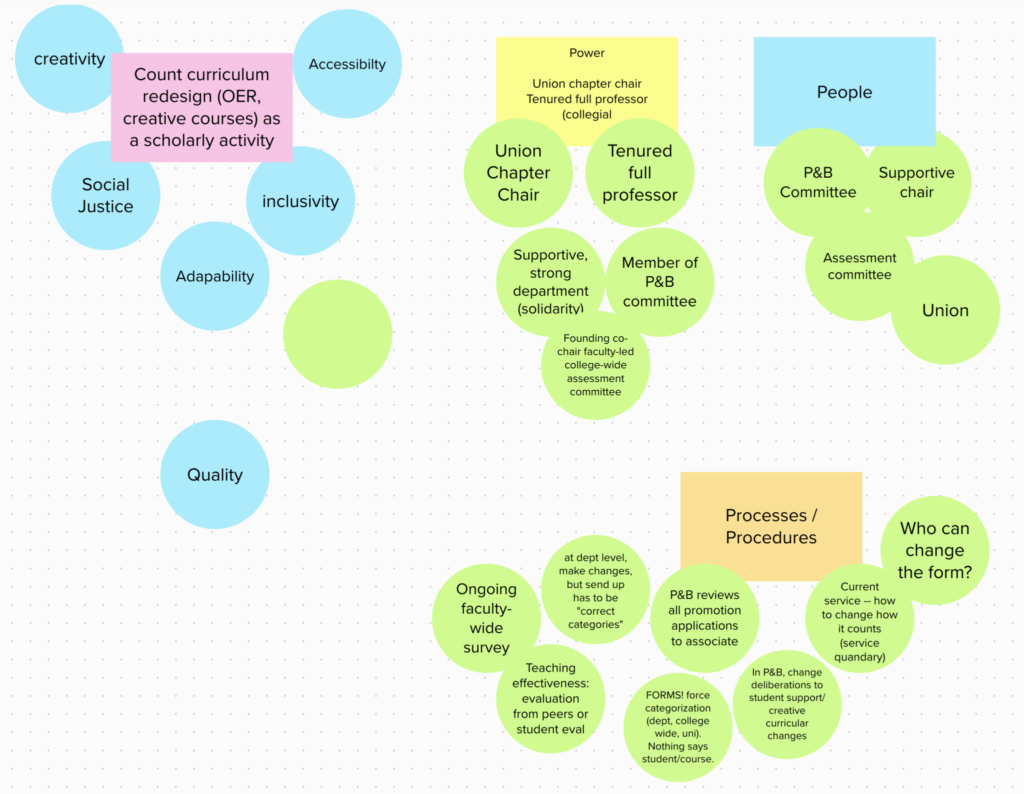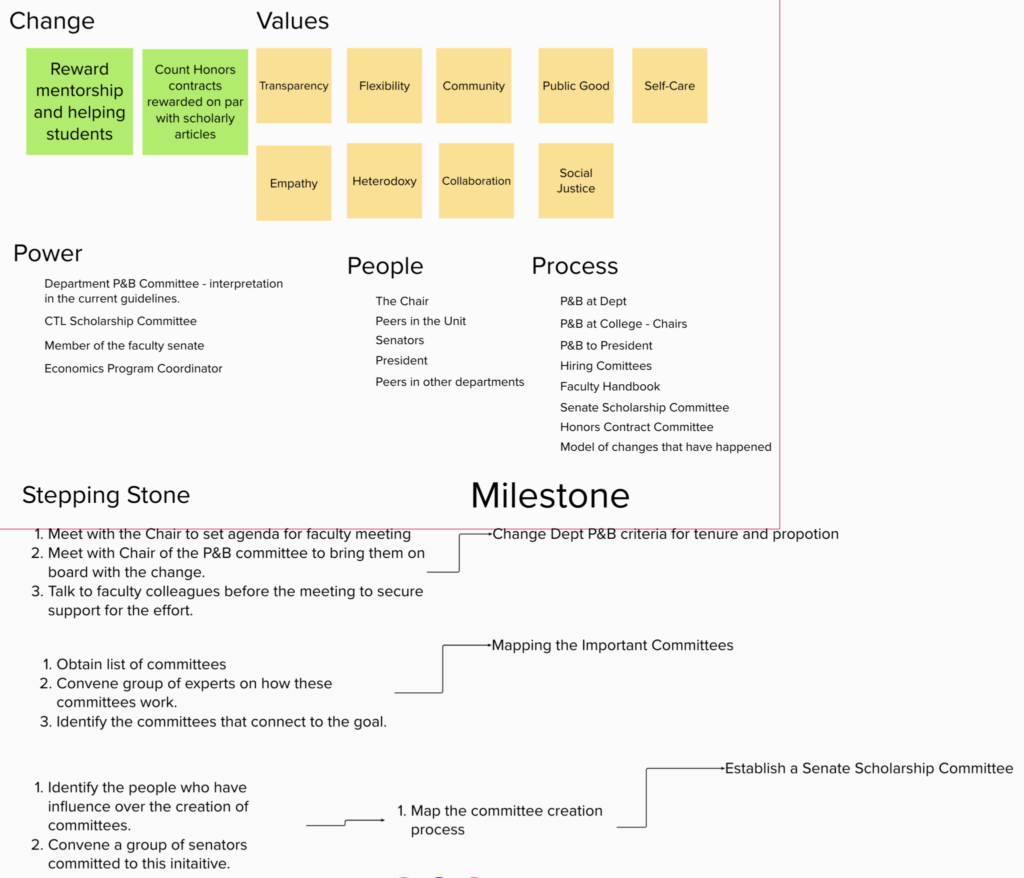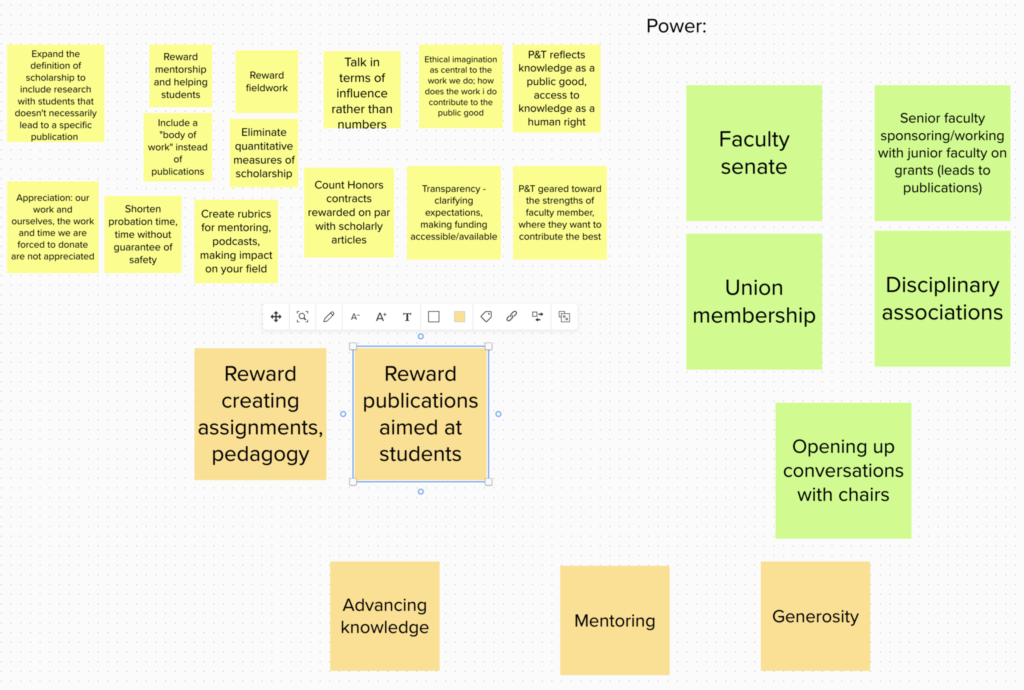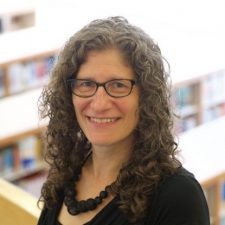At our last meeting with HuMetrics, we participated in a people-power-process exercise, and identified meaningful changes we would like to make (see images above). In this discussion, please expand on your thoughts from that exercise, also drawing on our earlier conversation about values:
- What steps have you already taken to move Reenvisioning Scholarship forward at BMCC?
- What additional steps do you plan to take (as an individual, in collaboration with others in your department, cross-departmentally) to move Reenvisioning Scholarship forward?
- What can we as a community do to move Reenvisioning Scholarship forward?




14 thoughts on “Moving Reenvisioning Scholarship Forward”
As we reflect on our recent discussions around re-envisioning scholarship assessment for tenure at BMCC, I am struck by the critical role each of us plays in this transformative journey. In my view, the seeds of change lie in our current roles and the interactions we engage in every day.
Our positions, whether we’re faculty, administrators, or staff, provide us with unique perspectives and influence. It’s from these vantage points that we can begin to foster a deeper, more inclusive understanding of scholarship. As we navigate our daily tasks, let’s remember to bring this broader vision of scholarship into focus, valuing all scholarly efforts within our community. Currently I am:
– Connecting with faculty during department meetings and discussing options for change in Business Management
– Discussing how it relates to the Campus-wide Assessment Committee which I serve on
A key vehicle for promoting this change lies in our regular meetings. These gatherings are not just administrative necessities but are platforms for dialogue, collaboration, and change. Over the next year, I propose we consistently raise the topic of scholarship reform in these settings. Let’s use our meetings to challenge outdated notions, inspire fresh ideas, and strategize practical steps towards our shared goal.
But we can’t do this alone. Building a more equitable and expansive view of scholarship requires a collective effort. Thus, I encourage each of us to reach out to others in our community who share this vision. Let’s bring more voices and ideas to the table, enriching our discussions and strengthening our collective impact. By connecting with like-minded individuals, we can form a powerful coalition committed to redefining scholarship at BMCC.
As we embark on this journey, I want to express my deep gratitude to the Re-envisioning Scholarship Planning Team. Jean Amaral, RaShelle Peck, Michelle Ronda, and Gina Cherry, your dedication and hard work are truly inspiring. Your efforts have laid the groundwork for this important dialogue and have ignited a spark that will undoubtedly lead to significant change.
In closing, I am reminded of a quote by Margaret Mead that seems particularly apt: “Never doubt that a small group of thoughtful, committed citizens can change the world. Indeed, it’s the only thing that ever has.” Let’s be that group for BMCC, working together to ensure that all scholarly efforts are recognized, valued, and celebrated.
Together, we can redefine scholarship at BMCC and pave the way for a more inclusive, equitable, and vibrant academic community.
I liked this process because it maintained our basic values of teaching/research/service while looking not only at fruits of our labor, but everything it takes to have an orchard in which the fruits are grown and harvested.
I liked the fact that we had a forum to discuss the issues and obstacles that we face as scholars in a increasingly profit-driven educational institution. Unfortunately, not much was accomplished in terms of achieving real change, lots of talk and reflections but everything continues the same.
Thanks to everyone for some really thought provoking work this semester. I’m looking forward to continuing to find ways to push for a more expansive and equitable perspective on what counts as scholarship across the college. In the meantime, as a tenured faculty member on my department’s P&B I’m looking forward to bringing this lens back into our work in Teacher Education.
I really appreciated the conversations and the way the software helped with visualization and collaboration. One issue that I deal with a lot is gate keeping in academia. I feel like there are a lot of artificial divisions and boundaries such as: research versus practice/ qualitative versus quantitative/ teaching versus scholarship. I believe innovation happens when those boundaries are dissolved. At BMCC I am most interested in challenging the research/practice and teaching/ scholarship boundaries. As an educational and psychological researcher I believe that we are in the best position to bring new insights about learning processes, the unique needs of our generally underserved student population and many other related areas that are ripe for scholarship. That will continue to be my focus as well as continuing to investigate children’s unique processes of development.
The fellowship activities were a thought provoking experience. The software and the team running the seminar pulled for thinking about things that we often take for granted. Thinking in terms of values was especially helpful for figuring out where everyone in the discussions was coming from, and where we could find common ground. The divide between tenured and untenured faculty was more clear to me in this setting that it has been in other interactions on campus, as a result of the values driven discussion. I came away from the experience with a new zest for helping my untenured faculty get published. I wrote a grant proposal with an untenured colleague which could result in a publication for them (for us). I also presented at conference with a new PhD with the understanding that we would publish a paper. Finally, I have continued to push to include untenured scholars as authors on the papers that are being written to present the findings of my NSF funded research team.
I am aware that these steps stay within the traditional scholarship model, but they are helpful nonetheless. In terms of making change, I have supported colleagues for senate and P&B in our department because they are open to these newer ways of thinking about scholarship. I shall continue to do so. I am also speaking with Jean Amaral about publishing a piece or pieces regarding these conversations in the Inquirer, BMCC’s on campus journal to bring more attention to these important ideas. Thank you again for involving us in these exercises and discussions. They are timely, and needed.
I agree with all the wonderful comments above mine. Shane’s vision of collective effort is so inspiring. Yet what Aldo said, that “everything continues the same,” feels true as well. Gatekeeping in academia, as Rebecca said, continues to be a challenge.
Personally, I feel like I have hardly taken any steps, but I have to remember that I only just came to understand the nature of the issue. My biggest take away was that we value what we can measure rather than measuring what we value. And that’s just ridiculous, especially at the community college level where we do so much more than what’s being measured. My students are what I value the most of all, and how I work with them to build a more inclusive classroom.
I talked to my department chair and began conversation in the academic senate. In the future, I would like to think more about how the union can take up this issue of what we value. And how we can think more of the union as “us.” And generally, how we can think more of social justice as something we all do and value as part of our teaching and scholarship.
I took my students to City Hall two weeks ago to protest the budget cuts. It was awesome.
As a community, I would like more chances to talk about how to bring social justice to the classroom, and how to value this work.
Moving forward, it would be very interesting to know if some chairs and P&Bs have begun to implement some changes (prior this workshop) that align to the values and ideas shared by the participants in the workshop.
I thought this workshop was a great vehicle to start having conversations across departments about the differences in how scholarship and other activities are considered for promotion and tenure. There is a lot of variation between departments, which can be good and bad. It can be positive because our fields can be very different, and having faculty in different departments control the way scholarship is counted allows for flexibility. On the other hand, there seem to be issues of clarify and consistency across departments, as well as issues within departments when some values are prioritized over others. I think even having these discussions and making one another aware of the differences and general approaches is an important first step in the process of shaping the way BMCC the institution considers the work and values of the faculty and staff.
So much of the traditional definition of scholarship needs to be unlearned before any change can meaningfully happen. Recalibrating what is actually useful to our community in terms of scholarship is an important part of it. But since change can only happen from those in positions of power, it is important to have administrators who can actually exact change based on what they hear from the faculty. It is a slow process, but I’m hopeful that it will happen.
What steps have you already taken to move Reenvisioning Scholarship forward at BMCC? I have shared some of our conversations with my supervisor.
What additional steps do you plan to take (as an individual, in collaboration with others in your department, cross-departmentally) to move Reenvisioning Scholarship forward? In a recent workshop, I suggested that we continue informal meetings to continue this conversation and others that I think are necessary for healthy professional growth in our work environment.
What can we as a community do to move Reenvisioning Scholarship forward? I think that we should not be afraid to chek up on each other, ask questions, and if we are afraid to ask the right questions, look for allies who can serve as the medium for a continuing conversation.
With my apologies, I have taken no steps. In my department, I feel that many things “count” for tenure and promotion, though they may not count as and do not replace the “bucket” that’s called “scholarship.” I think it would be an insurmountably hard sell to convince people to move call things that have usually been in one “bucket” (say, student mentoring, which would have been in the “teaching bucket”) into the “scholarship bucket,” and at least in my field, I also value (and enjoy) traditional scholarship and would not want to see that struck off the list. From our conversations I did get the impression that departments do things in quite a variety of ways and I wonder if a productive next step would be to actually gather this information so it may be openly talked about. I was surprised to hear of departments that don’t even have a written guide, for example. In spite of my own lack of steps-taking, however, I did value the conversations very much as I had come into the workshops expecting pretty narrow debates and the convos were much more thoughtful and meta than I expected.
What steps have you already taken to move Reenvisioning Scholarship forward at BMCC?
I keep putting my dance and cultural work and community service down as scholarship on my reappointment reports every year (even when my chair sometimes deletes them from the final report). I am also seeking more collaborative opportunities with researchers and universities in Uruguay and Brazil, trying to organize more public-facing events and conferences. Lastly, I am getting my students in on doing the work, by assigning them projects that require them to do research and interviews, essentially collecting data that we publish on our course sites or on OpenLab. (Of course, I do not publish my students’ work as my own).
What additional steps do you plan to take (as an individual, in collaboration with others in your department, cross-departmentally) to move Reenvisioning Scholarship forward?
I hope to organize international conference centered on dance and community togetherness. This coming year as a coordinator for the Language, Society and Culture FIG I hope to arrange encounters for colleagues at BMCC to share their scholarship and find opportunities for collaboration.
What can we as a community do to move Reenvisioning Scholarship forward?
I believe, unfortunately, a lot of it comes down to money. How can we get more funding for alternative forms of scholarship? Can we get in touch with folks at the NEH, Mellon Foundation, etc, to have an open conversation of the kinds of projects they look to fund? Can they accept a project proposal from someone that does not have a list of traditional publications?
– What steps have you already taken to move Reenvisioning Scholarship forward at BMCC?
I have discussed these issue with some of my colleagues, making them aware that there is a sizable number of people interested in doing something about both the general issues of what counts as scholarship, but also about the institutional issues that feed into how scholarship is viewed and rewarded.
– What additional steps do you plan to take (as an individual, in collaboration with others in your department, cross-departmentally) to move Reenvisioning Scholarship forward?
Try and bring about reforms in my department. E.g. changing tenure and promotion criteria at the p&b level, trying to make the p&b process more transparent and accountable. I would support anything in the faculty senate. However, I do not have tenure, and so I feel constrained in what I am able to do or propose safely. I will look for opportunities to bring up these issues in the union.
– What can we as a community do to move Reenvisioning Scholarship forward?
Be vocal, and persistent, in criticizing the commercial/corporate/vocational values that are imposed on us; making the case that these values are antithetical to scholarship, to our working conditions, to our student’s learning and learning conditions, to education in general. Even when we have no power to oppose any decisions or policies and we are forced to simply obey, I think there is value in making it known that the policy/decision is badly conceived, that it is harmful, that it does not have support. For me the most valuable part of these conversations is the visibility of the criticisms people have of the system.